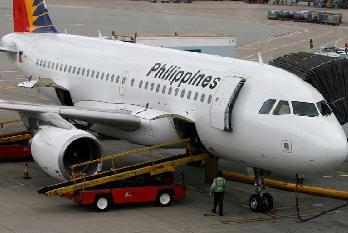|
|||||||||||
|
|
|
|||
|
By Jim Douglas |
||||
 |
August 2, 2010 - Philippine Airlines (PAL) on Saturday had to apologize to its passengers as a result of many of their pilots walking off the job due to low wages.
The airline was
forced to cancel a number of national and overseas flights, as the
airline did not have an adequate number of flight crew to fly its Airbus
A320 airplanes.
Nearly a dozen pilots have walked off the job over the pass several weeks and have taken jobs with higher paying overseas air carriers. The airline is unable to match those salaries offered by theses carriers to captains and copilots flying the Airbus A320. |
|||
|
|
||||
|
The company has reported pilots who have resigned are in violation of their contracts with PAL as well government regulations that would require resigning pilots to give PAL a minimum resignation of six months which would give the airline time to recruit, train and place a pilot replacement in the cockpit.
PAL will has
indicated that the airline will file appropriate charges against pilots
who chose not to report for work immediately after submitting
resignation letters. Most
of the pilots still owe PAL the cost of their aviation school training,
which run into millions of pesos per pilot.
Government
officials are expected to meet with management at Philippine Airlines
and Airline Pilots Association of the "I understand it will be two separate meetings. The end point being to address the situation and to remind everybody, PAL for instance, that they do have obligations when they secured the franchise to operate this public conveyance. The pilots also have an obligation. |
||||
|
"There has been
disruption to our tourism efforts and to other aspects of the economy
that would need their services. If this is not warranted, they lay
themselves open with appropriate charges. Hopefully, we will be able to
come up with a resolution so that the riding public is not
inconvenienced and the economy does not suffer in what is an
inter-company dispute," Aquino said.
PAL spokesperson,
Jonathan Gesmundo indicated that most of those pilots who resigned were
newly hired pilots and that the pilots had given their resignation
letters and then walked off the job. ?The A320 is the first jet a pilot
flies after graduating from aviation school,? Said Gesmundo. Flights
from
Philippine
Airlines, Inc. (abbreviated PAL), also known historically as Philippine
Air Lines, is the national airline of the
The airline,
headquartered in the Philippine National Bank Financial Center in
Formerly one of
the largest Asian airlines, PAL was severely affected by the 1997 Asian
Financial Crisis. In what was believed to be one of the Philippines'
biggest corporate failures, PAL was forced to downsize its international
operations by completely cutting operations to Europe and eventually
Southwest Asia, cutting virtually all domestic services excluding routes
operated from Manila, reducing the size of its fleet and terminating the
jobs of thousands of employees.
The airline was
placed under receivership in 1998, gradually restoring operations to
many of the destinations it formerly serviced. PAL exited receivership
in 2007 with ambitious plans to furthero its previously-serviced
destinations, as well as diversify its fleet. |
|
|
| Other News Stories |
| ?AvStop
Online Magazine
Contact
Us
Return To News
|
|


